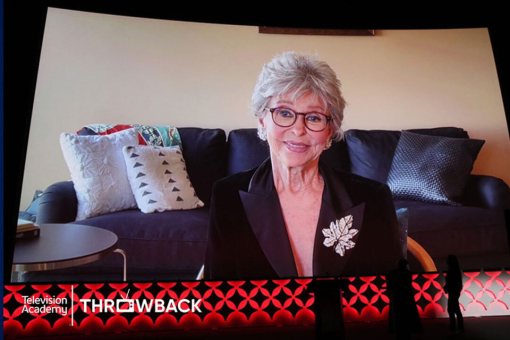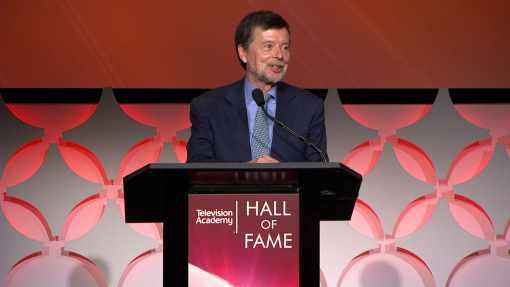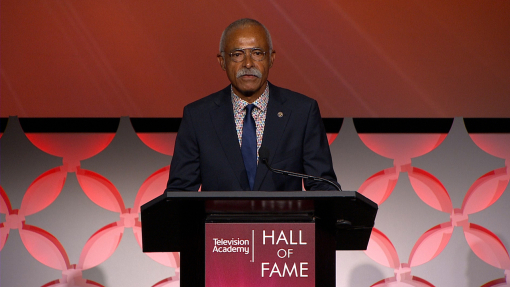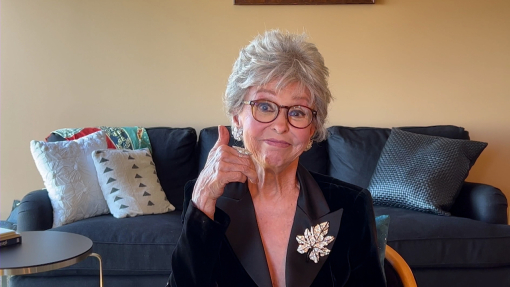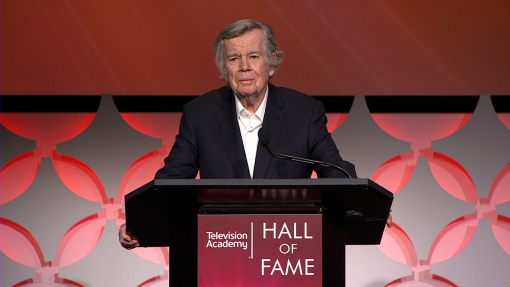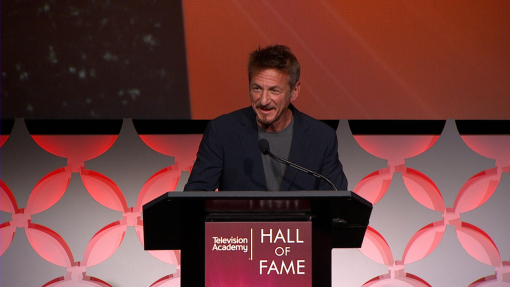Johnny Carson became a national phenomenon in the early 1960s, about the time the civil rights movement was heating up and the Vietnam War began to sweep across the national consciousness. After the seriousness of the 11:00 p.m. news, with its reports of sit-ins, campus demonstrations, urban riots, and assassinations, the nation’s viewers needed an electronic antidote.
Maybe that’s why the relaxed, light satire of Carson’s humor became so addictive. He was always there with his boyish good looks, his midwestern sense of propriety, his nimble, topical wit. Even those off-color jokes, uttered with that startled, adolescent innocence, were reassuring.
The Tonight Show Starring Johnny Carson has galloped across the airwaves for the past 25 years to become one of the longest-running shows in the history of American television. An entire generation has reached adulthood and another has advanced into late-middle (or old) age watching Johnny Carson.
His show has made a significant contribution to American comedy for the past two decades by launching the careers of some of the nation’s best comedians, including Steve Martin, David Letterman, Robin Williams, and Michael Keaton.
By promoting authors, showcasing musicians, plugging songs, and publicizing new movies and Broadway shows, The Tonight Show has left an indelible stamp on contemporary pop culture.
Tonight serves as a social barometer as well. “You can get the mood of the country pretty quickly through the show,” says Carson. “People are quick to let you know what they think.” He lets others determine the significance of his show, however. “I don’t attribute any great social message to it. It’s just entertainment.”
But Carson is more than an entertainer. He has become one of television’s most powerful figures. Brandon Tartikoff, president of NBC Entertainment, describes Carson as “the cornerstone of the NBC network.” From the very beginning, the comedian carved a niche for his show at the top, where it still reigns as NBC’s largest single moneymaker.
Carson’s career as an entertainer began when he was a youngster obsessed with magic. Reading Hoffman’s Book of Magic changed his life. “It got me performing,” Carson recalls. Born in Corning, Iowa, on October 23, 1925, he grew up on the plains of eastern Nebraska in the town of Norfolk, population 15,000. It was here this middle child of a lineman for the Nebraska Power and Light Company practiced his magic as the Great Carsoni.
During the late 1930s, the Norfolk Rotary Club, the 4-H Clubs, and the county fairs were all entertained by the Great Carsoni. He took his magic — and the light comedy and timing he was learning — into high school, where he wrote a comedy column for the Norfolk High paper, acted in school plays, and generally established a reputation as the funnyman of the class of ’43. “You have the ability to make people laugh,” his algebra teacher wrote in his yearbook. “You will go far in the entertainment world.”
Magic and a new obsession with ventriloquism followed him into the U.S. Navy, where he found an eager audience. “When you’re in the service, it’s easy to entertain because servicemen are starved for entertainment," Carson claims. Moreover, because such audiences are very forgiving, “they provide you with an opportunity to expand.”
But he didn’t want to perform forever. What he wanted was a career in journalism, which, with his military obligations out of the way, he chose to study at the University of Nebraska at Lincoln. Soon, however, he grew bored with the subject and switched to radio and speech.
His college degree apparently served him well enough to lead him to Omaha and a $47.50-a-week announcing job at radio station WOW. There he did everything: commercials, weather reports, station breaks, plus a morning show called The Squirrel's Nest.
After about two years at WOW, he landed a job in 1950 as staff announcer at KNXT (now KCBS-TV) in Los Angeles, where he soon began hosting his own local comedy show, Carson’s Cellar. Red Skelton became a fan of the Sunday afternoon program, and when it went off the air in mid-1953, Carson began writing material for his mentor’s CBS comedy-variety program, The Red Skelton Show.
The performer in Carson reemerged rather abruptly when Skelton ran into what was supposed to be a breakaway door during rehearsal. The door refused to budge, Skelton suffered a concussion, and Carson received a frantic phone call asking him to substitute for the comedian.
As he sped to the show that evening, Carson began to compose his opening monologue, and that night he showed Ruby Keeler a thing or two about going on in the star’s place. After the dust settled. Jack Benny offered this reaction: “The kid is great, just great.”
By the summer of 1954, the kid had already served as emcee on the short-lived Earn Your Vacation, a CBS quiz show. Now, with Hollywood still talking about the night he substituted for Red Skelton, he was offered his own comedy-variety series, The Johnny Carson Show. An amalgam of humorous sketches and singing, the CBS show was telecast Thursday nights during the 1955-56 season opposite NBC’s ratings champ, Lux Video Theatre. The results were fairly predictable: the Carson show limped along until the end of the season, then it was dropped.
With the show’s cancellation, Carson’s career took a sudden nose dive. Unable to find work in Hollywood, he went to New York. He made guest appearances on several quiz shows; he replaced Tom Ewell for four months in Tunnel of Love on Broadway; he performed on CBS’s Playhouse 90 in Three Men on a Horse; he made the rounds at the Friars’ roasts, honing his craft with the best in the business. “I did just about everything,” he remembers. Then, in 1957, he landed the emcee spot on ABC’s quiz program, Who Do You Trust?, and became the hit of daytime television.
Titillating viewers with his off-color boyishness and his double entendres, Carson presided over Who Do You Trust? with a wickedness that kept ratings high and advertisers happy. He remained with the show until 1962, when he assumed his duties as host of The Tonight Show Starring Johnny Carson.
By 1962, The Tonight Show had been a part of American television for eight years. Steve Allen had been its first host, a post he held from 1954 to 1957. And after a brief retitling (Tonight! and America After Dark), Jack Paar had followed. After almost five years on the show, Paar, exhausted by his numerous public feuds and emotional outbursts, made a noisy exit. Now the cognoscenti were wondering if neophyte Carson could fill the master’s shoes.
On October 1, 1962, Carson’s Tonight Show made its debut with nearly as much hoopla as that accompanying the premiere of Gone With the Wind.
On this night, the new host was introduced by Groucho Marx. (Carson’s announcer from Who Do You Trust? — Ed McMahon — joined him later.) After his monologue, Carson began talking with his first guests: Joan Crawford, Rudy Vallee, Tony Bennett, and Mel Brooks.
As their host, Carson didn’t initiate any feuds. He didn’t indulge in any outbursts. He shed no tears. Viewers, who had been fascinated by Paar’s excesses, were drawn by Carson’s unflappability and his apparent lack of pretension. They grew to respect his decency and his sense of privacy. He was that rare phenomenon: a private television personality.
The show thrived.
Through the years, Carson, who concentrates much of his attention on his monologues, has given his comedy another dimension and more variety by developing a wide range of characterizations. Carnac the Magnificent, who divines the answers to questions in sealed envelopes; Aunt Blabby; a testy old woman; Art Fern, the sleazy host of Tea Time Movies; David Howitzer, the bombastic consumer advocate; El Mouldo, a demonstrative vampire; and G. Walter Schneer, a crusty government employee.
Many of those characters can be seen in a syndicated show titled Carson's Comedy Classics, a compilation of some of the comedian’s sketches taken from The Tonight Show and packaged by Carson Production Companies. The firm’s TV division produces Amen for NBC and Mr. President, with George C. Scott, for Fox Broadcasting. Carson Productions also underwrote the films Desert Bloom and The Big Chill. The latter, a hit, was the company’s first movie.
But it is to television — and especially to television comedy — Carson has given his allegiance and much of his energy.
Writing in the Los Angeles Times, critic Lawrence Christen summed up the Carson style of comedy best when he observed:
He has lightness, grace where called for in a medium that plays up flash, a stinging wit, and the courage to venture out nightly into topical issues while at the same time keeping us ignorant of his personal politics. … One of his charms is the decency with which he treats the unslick and unpretentious. No ego, including Carson’s, is immune to the seduction of power. But in his way he’s remained true to himself, and his monologues still have their share of pearls … He still wears like a well-cut summer suit.
This tribute originally appeared in the Television Academy Hall of Fame program celebrating Johnny Carson's induction in 1987.

